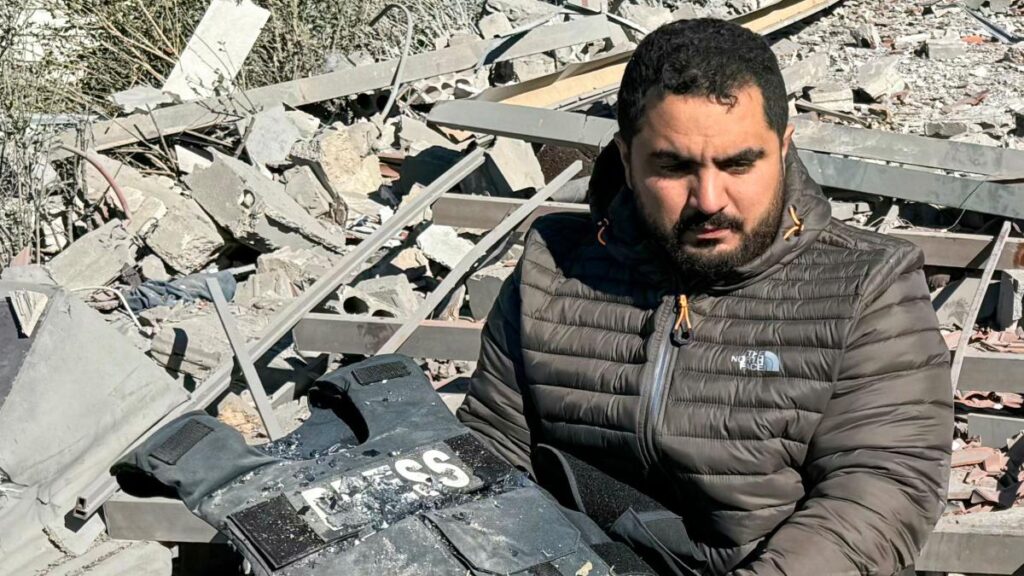On October 14, 2023, a tragic incident occurred when three Lebanese journalists were killed in an Israeli airstrike that targeted a building in Hasbaya, Lebanon, known to be housing reporters. This strike has raised significant concerns regarding the protection of journalists in conflict zones, particularly as evidence suggests that the building was being used as a guesthouse by over a dozen journalists from various media organizations. These journalists included Ghassan Najjar and engineer Mohamed Reda from Al Mayadeen TV, both pro-Iranian outlets, and Wissam Qassem from Hezbollah-affiliated Al-Manar TV. The Israeli military stated that the airstrike targeted a Hezbollah structure but acknowledged that it was reviewing the incident following reports of casualties among journalists.
Witness accounts and reporting from local broadcasters indicated that the airstrike deliberately struck a compound identified as a safe haven for journalists. Al-Jadeed TV reported extensive damage to the building, capturing visuals of the scene that included overturned vehicles marked with “press” and collapsed ceilings. Youmna Fawwaz, a reporter from MTV Lebanon, recounted the moments following the bombing, describing the chaos and destruction as journalists narrowly escaped being trapped under rubble. She emphasized that the location was well-known to both Israeli and Hezbollah forces, highlighting a concerning atmosphere of hostility towards media personnel amid the ongoing conflict.
Lebanon’s Information Minister, Ziad Makary, condemned the strike as a blatant “war crime,” asserting that the attack was planned and executed with full knowledge of the journalists’ presence. He characterized the assault as an attempt to intimidate reporters covering the conflict, aligning this incident with broader tactics observed in Gaza, where journalists face escalating risks. The international community, particularly organizations dedicated to press freedom, echoed these sentiments by emphasizing that targeted attacks against media workers violate international law. This incident forms part of a troubling pattern, as Lebanon has experienced rising levels of violence against journalists since hostilities erupted, with previous strikes having already claimed lives, including that of Reuters journalist Issam Abdallah.
The context of the airstrike intertwines with a deteriorating security situation in southern Lebanon, which has witnessed an escalation of Israeli assaults following the outbreak of hostilities between Israel and Hezbollah in October 2023. The recent airstrikes and military operations have instigated widespread destruction, with Lebanese officials reporting over 1,700 airstrikes in a matter of weeks and rampant dislocation of civilians in both Lebanon and northern Israel. Additionally, the United Nations peacekeepers have faced direct aggression, leading to the withdrawal from their posts, further complicating the humanitarian landscape in the region.
Over the duration of the ongoing conflict, casualties have mounted significantly on both sides, with reports indicating nearly 2,600 fatalities in Lebanon alone, most occurring since the escalation of strikes beginning on September 23. Meanwhile, incidents of Hezbollah rockets targeting northern Israel have forced approximately 60,000 individuals from their homes. The intense bombardment from Israeli forces has resulted in extensive damage to infrastructure, with intelligence assessments revealing that the current destruction surpasses what was seen in an entire year of combat preceding the current escalations. These developments reflect a dire humanitarian situation marked by loss of life, damage to media facilities, and profound insecurity.
The backdrop of this tragedy not only exemplifies the hazards faced by journalists operating within conflict zones but also raises profound questions regarding the ethical conduct of military operations in relation to civilian and media personnel protection. Denunciations from media organizations and government officials critiquing the airstrike underscore the transformative impact of information warfare on international discourse. Amidst the combat, there are fears that hostile actions against the press could inhibit coverage and accountability in a region already fraught with challenges. The growing body count and devastation present in Lebanon signal an urgent need for earnest dialogue about protecting civilians and media workers in warfare.

